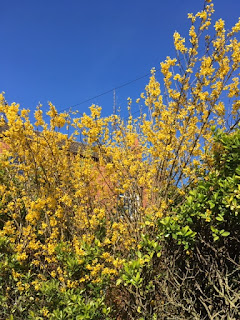In this time of fear and physical isolation, it has been lovely to go out for my daily allowed walk, and to see the beauties of Nature unfolding in front of my eyes. Just before we were confined to the village, my husband and I went for a walk at Castle Ashby and saw these two beautiful magnolias, which will now be blossoming unseen by any except the gardeners...
And just around our village, there are beautiful flowers blooming in the Spring sunshine, whether in the hedgerows...
or in neighbours' gardens, which have lifted my heart so much...
Flowers are Nature's laughter. Even reading that made me smile. Every time I see a flower blooming I will smile right back at it. I've noticed a new influx of nature photos on Facebook - it seems that other people have had the same idea. And some people have commented that my photos have cheered them up too.
This current situation is deeply scary. And it's okay to admit that we are scared. Nothing like this has happened on this scale for very many years. It helps me, when I remind myself how much worse it would be, if we didn't have so many other ways of communicating - by phone, by e-mail and through social media. Not to mention conference call virtual meetings, which many Unitarian churches and chapels are experimenting with. I am grateful for all the ingenious ways people are coming up with at keeping in touch with each other, and for the IT facilities which enable them.
I had some fun yesterday... I had my first Face Time piano lesson. My piano teacher and I each sat at our pianos, linked by our iPads, and it worked really well. She could see my fingers as I played, and hear what was happening. And I could see and hear her demonstrating how it *should* be done :)
And the idea of clapping the NHS was a fabulous one! I'll finish with a prayer, which I'm using in weekly online services for my District:
Spirit of Life and Love,
Be with us as we gather for worship,
each in their own place.
Help us to feel a sense of community,
even though we are physically apart.
Help us to care for each other,
in this difficult time,
keeping in touch however we can,
and helping each other,
however we may.
We hold in our hearts all those
whose lives have been touched,
in whatever way,
by the coronavirus and the fall-out from it.
Amen









